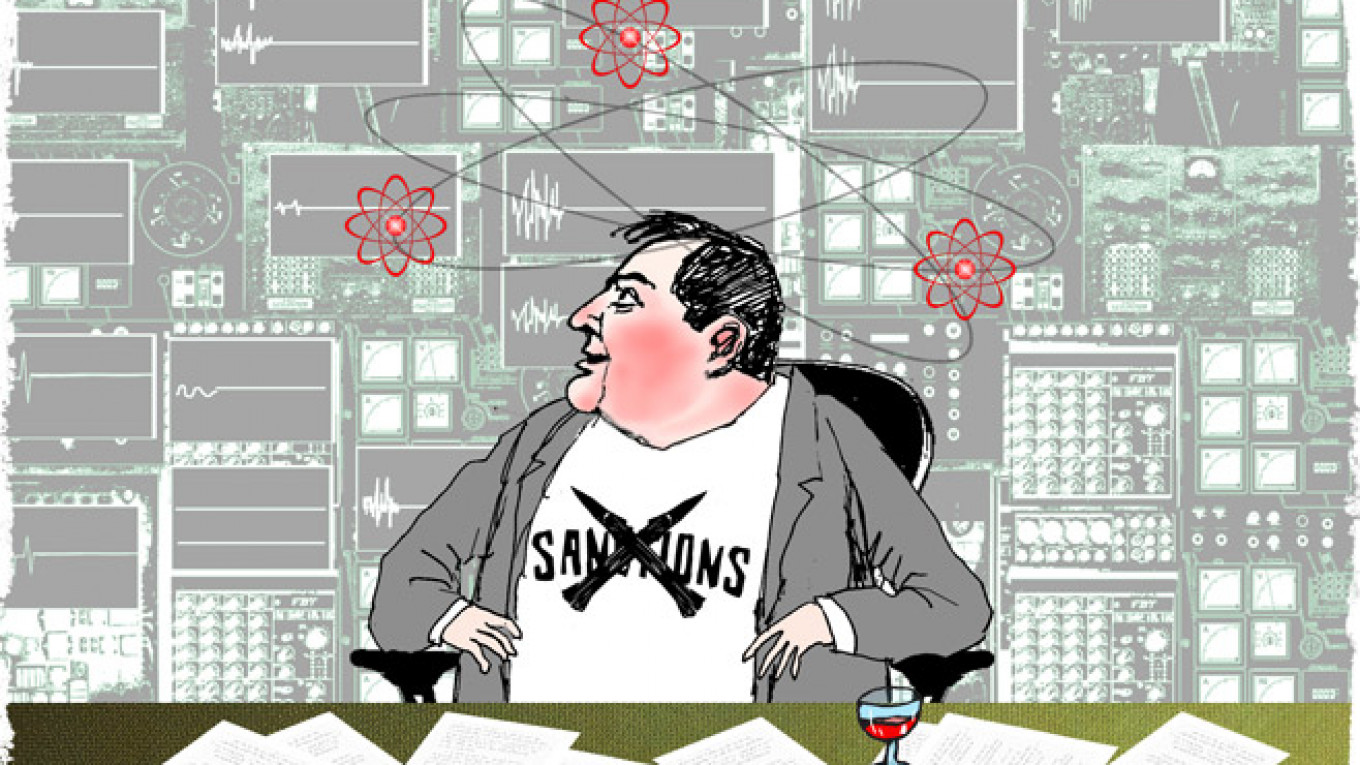Muscovites are staging a campaign against Western sanctions called: "Fighting sanctions with fashion." Participants trade in their old T-shirts with Western slogans for new shirts bearing such inscriptions as: "Sanctions? My Iskander laughs at sanctions," or "The Topol couldn't care less about sanctions" — references to Russia's Iskander and Topol ballistic missiles.
Several major Moscow companies are funding the campaign, including Vnukovo Airport, the Transtroyinvest construction company and the Baikal corporation. It is by no means an individual initiative: The T-shirt giveaway has the direct support of the Public Relations Committee of the Moscow City government.
Here we have ostensibly well-adjusted businesspeople and public servants convincing their fellow citizens that they should take pride in Russia waging an undeclared war on a neighboring country and annexing part of its territory — and knowing that nobody can stop Russia because it has the ability to destroy all life on this planet.
Of course, the U.S. has the same capability, but everyone knows that U.S. President Barack Obama hasn't got the guts to push the button. Not so with Russian President Vladimir Putin: After Crimea and the Donbass, unpredictability has become Putin's trademark style.
I must say that even Soviet propagandists never allowed themselves to speak so flippantly about the prospect of nuclear war. They only referred to that possibility within the context of deterring U.S. nuclear aggression.
It seems that a sort of nuclear euphoria is sweeping the country. Whereas we might expect such comments from Kremlin spin doctors whipping up anti-Western hysteria, now even senior officials have joined the nuclear bandwagon in all earnestness. Dmitry Rogozin, the deputy prime minister charged with overseeing the defense industry, recently made the sensational statement that Russia would completely renew its nuclear forces by 2020.
If true, it means leaders have just six years to retire and replace 52 SS-18 missiles, which NATO calls "Satan" missiles, 40 SS-19 missiles and 108 SS-25 missiles, which are the old, increasingly obsolete Topol missiles.
The Russian navy would also have to completely replace seven of its Delta III, Delta IV and Typhoon-class nuclear submarines. The air force would have to scrap and replace all its nuclear bombers, the "youngest" of which have already served for 25 years. The recommended service lives of these weapons expired long ago, but they have received several extensions since.
Where will all of those new weapons come from? The situation is relatively clear with the navy. Eight new Borei-class nuclear submarines are slated to go into service by 2020. Three are in varying stages of readiness, and only three more are currently under construction. Considering that, under the best of conditions, the production cycle lasts about six years, it is already clear that at least four submarines will miss the deadline. But at least the government's plans are clear in this regard.
But it remains a mystery as to which "ultra-modern weapons" Deputy Prime Minister Rogozin referred to concerning the air force. After all, official statements claim that the testing phase for a new bomber aircraft will begin no earlier than 2019, with serial production starting only in 2025.
Ground missiles are the biggest question. Here the problem concerns not only the number of missiles, but also the number of warheads that each carries. Every SS-18 carries 10 warheads, every SS-19 has six, and each of the old Topol missiles carries one warhead apiece. If the military retires all of those missiles, it would reduce Russia's nuclear capacity by 988 warheads, or two-thirds of its total nuclear potential.
The new Yars missiles carry just four warheads each — too few to fully compensate for such a reduction. Therefore, Moscow has placed all its hopes on the new Sarmat missile, which sources say is designed to carry 10 warheads.
There is just one hitch: The Sarmat is still in the design-and-development phase, and officials expect its completion no sooner than 2018. Bear in mind also that Russia has no experience developing heavy-lift missiles: Ukraine produced them during the Soviet period at facilities in Dnipropetrovsk.
Today, Russia builds those missiles at its Makeyev Rocket Design Bureau, which previously specialized in building only sea-based missiles. It is worth recalling the troubled fate of the Bulava sea-based missile, which was plagued by failed tests and created by the same entity that had previously made only the land-based Topol missile.
Western sanctions will also have an impact. Now, Russia will have to first manufacture the necessary machinery needed to even begin production of the new missiles.
All of that makes the complete modernization of Russia's nuclear forces by 2020 an illusory dream. Rogozin is either telling a deliberate lie or does not understand the reality of the situation. But, of course, who pays any attention to such trifling details when the country is gripped by nuclear euphoria?
Alexander Golts is deputy editor of the online newspaper Yezhednevny Zhurnal.
A Message from The Moscow Times:
Dear readers,
We are facing unprecedented challenges. Russia's Prosecutor General's Office has designated The Moscow Times as an "undesirable" organization, criminalizing our work and putting our staff at risk of prosecution. This follows our earlier unjust labeling as a "foreign agent."
These actions are direct attempts to silence independent journalism in Russia. The authorities claim our work "discredits the decisions of the Russian leadership." We see things differently: we strive to provide accurate, unbiased reporting on Russia.
We, the journalists of The Moscow Times, refuse to be silenced. But to continue our work, we need your help.
Your support, no matter how small, makes a world of difference. If you can, please support us monthly starting from just $2. It's quick to set up, and every contribution makes a significant impact.
By supporting The Moscow Times, you're defending open, independent journalism in the face of repression. Thank you for standing with us.
Remind me later.







